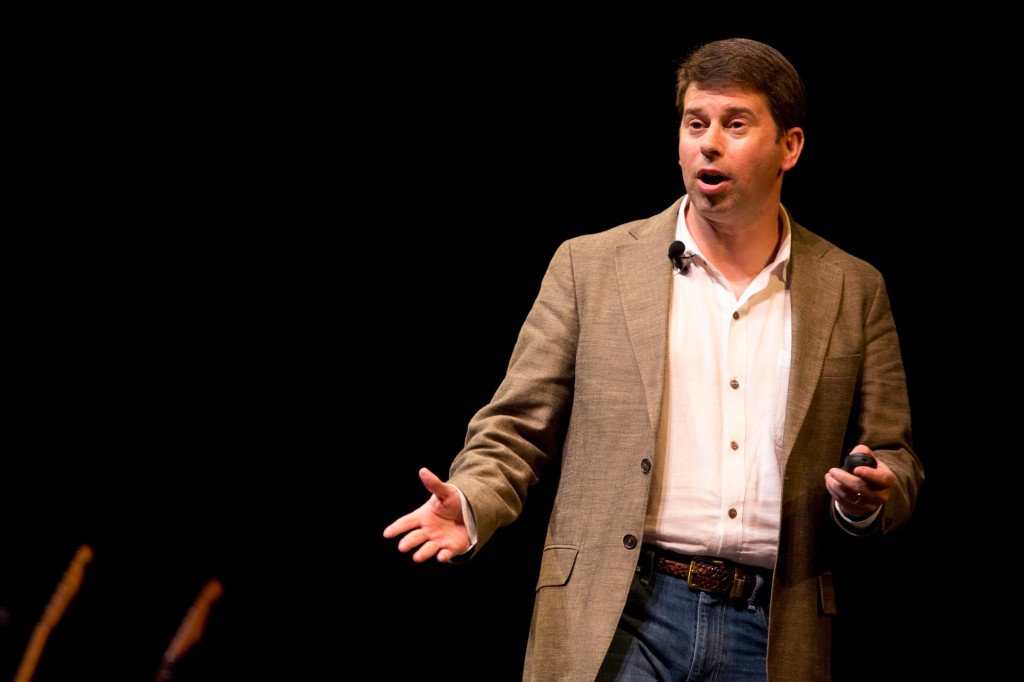
Daniel Drezner, a zombie wonk from Tufts University, has a bone to pick with the pop-culture lore of the living dead: Why is there so much apocalypse, but so little politics?
Drezner, a professor at The Fletcher School of Law and Diplomacy at Tufts University, is the author of “Theories of International Politics and Zombies,” a book that uses a zombie outbreak to expound theories of international policy.
In “The Night of the Living Wonks,” a 2010 article Drezner wrote for Foreign Policy, he said the “Unite-to-Fight-Zombie Liberals” would band together to create an international anti-zombie regime and neoconservatives would take an offensive stance, with preemptive strikes against the zombies. Governments adhering to realpolitik, Drezner says, would fight for their own self interest. As Drezner writes, “the realpolitik of zombies is that the strong will do what they can and the weak must suffer devouring by reanimated, ravenous corpses.”
Regardless of the policy, Drezner says that the apocalypse narratives are “overstated” and that a zombie outbreak would probably not wipe out humanity.
“Human beings are awesome,” Drezner said during his TEDx talk. “We invented duct tape.”
But where, he asks, are the movies where people finally kick some zombie ass?
Q&A
Pipe Dream: Why do you use zombies as a means to explain and understand different theories of foreign policy?
Daniel Drezner: Each of these theories has an internal logic and you can try to explain them in a sort of straightforward way, but some of them are a little arcane and some of them use language that’s not automatically easy for your average 18-year-old to grasp, but your average 18-year-old gets zombies. So you mention zombies and that automatically captures their attention and furthermore when you actually develop the theories, you can reference various pop culture narratives and they know what I’m talking about. So if I say “Shaun of the Dead,” very often, a lot of people in the audience will have seen the movie.
And in some ways, I didn’t choose zombies, zombies chose me — they’ve really taken off in terms of popularity. And so I wrote a blog post about this and foreign policy initially, and it generated a lot of attention, and I didn’t really think anything more about it.
Then I went to a conference, and a colleague told me, “I was trying to explain this theory of international politics … and my students, they weren’t getting it directly, but then I pointed them to your blog post and then they got it.” And so, that was when I realized it might be pedagogically useful.
PD: Were you a fan of zombies before that?
DD: Not really, actually. As a kid I was easily scared. I remember “Poltergeist” as a kid on the television, and it scared the crap out of me. So I didn’t really watch a lot of horror movies as a kid, or as a teenager, or even as a young adult.
I watched a couple before I wrote that blog post, and it was only once I decided to write the book that I kind of immersed myself deeply in zombie lore. I live in fear of Comic Book Guy saying, “I think you had it wrong in ‘28 Days Later’” — although that’s never actually happened.
PD: In your Foreign Policy piece, “Nights of the Living Wonk,” you consider the strengths and weaknesses of realpolitik, liberals and neoconservatism in the event of a zombie outbreak — which one do you think would be the most effective?
DD: The point of the book is not to say, “Here are all these theoretical approaches, clearly this one is superior.” In some way, the point of these theories is not to make — they do make some prescriptive policy recommendations — but they’re what social scientists refer to as “positivist,” meaning they would predict what would happen, not necessarily what should happen.
And I think the thing that I was struck by is that by and large what most of the theories end up predicting is that the world doesn’t end — which is interesting because because most of the zombie movies make that assumption. And so in fact one of the messages I have is that the zombie canon is far too pessimistic about humanity.
PD: Are there any more zombies in your future research and writing?
DD: I could write a longer paper version of what I’m presenting here (at TEDx), and if I want to I could do a revised — or dare I say revived — edition of “Theories of International Politics and Zombies.” And in theory I’ve got a great idea for a zombie novel, I’m just not sure I’m ever going to write it.
PD: Can you explain the premise?
DD: (Laughs) No, that gives away the surprise! It would be a zombie apocalypse-meets-“War of the Worlds”-type scenario — not the Tom Cruise movie, but the Orson Wells radio broadcast.
PD: If there was a zombie apocalypse, do you think you would be the first person the White House calls?
DD: You know, I would hope — who knows, maybe they already have. No, that’s not the case. Sure, I guess. If not, I’m going to New Zealand: It’s geographically remote; the food is good; there are a lot of mountains and zombies can’t climb terribly well; and the wines are excellent.


